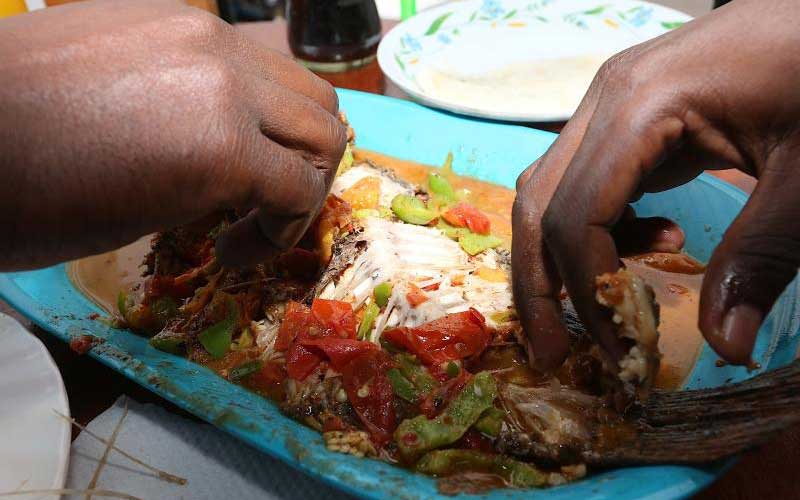
The increasing cases of food contamination leading to deaths and hospitalisation of Kenyans has cast doubts on just how safe the food we eat is handled.
The incidents come in the wake of the Kenya Association of Manufacturers (KAM) revelation that City Hall has not been testing food handlers for almost a year, raising suspicion on quality of food being consumed in the capital.
Food poisoning incidents are now making many Kenyans have butterflies in their stomachs when they attend social events such as weddings and bride-price negotiations and funerals.
The cases have mostly been reported to emanate from hotels, both high end and budget and outside catering firms serving food at social events.
The most recent incident is one where four people died in Ruirii village in Nyeri County after a bride-price negotiation ceremony turned tragic in a suspected case of food poisoning. Among the dead was mother of the groom and ten others were admitted to different hospitals with cholera-like symptoms, according to Nyeri County Director of Health Services Nelson Muriu.
The food for the 450 guests was reportedly supplied by Nairobi-based chefs hired by the groom.
In April this year, a Nairobi Hospital staff died and eight others admitted to the hospital after eating contaminated food prepared by a hired chef. Initial reports indicated that it was cholera outbreak but the hospital said there was no cholera outbreak and said the patient died from food poisoning.
In June 2017, 10 people among them 500 delegates attending a medical conference were hospitalised following suspected cholera outbreak at Weston Hotel in Nairobi. It was later discovered that the cause was food poisoning. A hotel staff in Nairobi who requested anonymity said that when they are preparing food for immediate consumption, there is probability for contamination due to time factor.
“If a hotel does not have clean production chambers, food can easily mix with dirt. At the same time, if the preservation method is not good, chances are high the food will be contaminated. “Since the hotelier might not want food to go to waste, he will devise way of keeping it consumable, including recooking in order to sell it food the next day,” he said.
Bare hands
The hotelier says the reason why some hotels indicate ‘Staff Only’ at the door to the kitchen is because some customers cannot stomach the processes that happen there.
“Hotel staff often hold food with their bare hands yet it is not allowed. Vegetable salads sometimes fall but are picked and still served,” said the source, who also said the low number of staff also leads to poor food-handling that can lead to food contamination.
The long importation process for foods such as meat and fish does not help even if the food is frozen for long, and more often than not, the customer ends up being served stale food.
According to Robert Juma, KAM Regional Coordinator for Nairobi, City Hall lacks capacity to test, track and prove that food has been tested.
He said the county has not been testing and issuing valid medical certificates of good health. “There are only four licensed public laboratories in the county capable of testing, and they are overstretched. This implies that food eaten in Nairobi is being handled by people who are not tested,” Juma said, and added that there is also the issue of the food handlers’ health status, which is often unknown
County’s public health officers normally demand that food handler’s adhere to the six months testing cycle by paying the usual testing fee. If one fails, then they should be arrested.
“In May this year, I went to City Hall for testing and after paying Sh1,000, I was asked to come back because they did not have reagents and test tubes. When I went back, I was given a certificate without being tested,” said a chef at a city hotel.
Nairobi County’s Deputy Director Public Health Maina Mano said it is not true that food handlers were not being tested, but it is true they lacked certificates.
“Food handlers were being tested and given a letter instead of certificate because we had issues with the supplier of the certificates,” Dr Mano said.
“We are soon going digital and a food handler after testing will be able to print a certificate online as opposed to getting a hard copy.”
He said they are now on high alert and their officers are picking food samples randomly from hotels to test it at their laboratories for contamination.
He added that city residents who eat prepacked food should check the label for contents and expiry date so as to make an informed decision when making purchases.
John Getanga, Executive Chef at Serena Hotel Nairobi said that cleanliness and proper storage of fresh food supplies is key in ensuring that food is safe for human consumption.
 The Standard Group Plc is a multi-media organization with investments in media platforms spanning newspaper print
operations, television, radio broadcasting, digital and online services. The Standard Group is recognized as a
leading multi-media house in Kenya with a key influence in matters of national and international interest.
The Standard Group Plc is a multi-media organization with investments in media platforms spanning newspaper print
operations, television, radio broadcasting, digital and online services. The Standard Group is recognized as a
leading multi-media house in Kenya with a key influence in matters of national and international interest.











